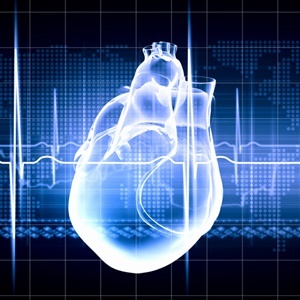
Cardiac tamponade is external compression of the heart due to increased pressure in the pericardium, the fibrous sac surrounding the heart. The increased pressure is due to accumulated fluid (effusion), which may be blood, serous fluid (thin and watery), exudates (from inflammation) or a mixture of these.
What happens in tamponade?
The heart is enclosed in a fibrous sac, the pericardium, which has very little ability to stretch. Fluid collecting in the sac quickly stretches it to its maximum. If more fluid collects and the pericardium cannot stretch any further, then the heart inside the sac becomes squashed.
The heart can thus hold less and less blood, so it cannot pump efficiently, and starts to cause symptoms. If fluid accumulates slowly, the pericardium can stretch to hold about 2 litres before tamponade occurs. A sudden increase in pericardial fluid (such as in the case of a brisk bleed) allows no time for stretching of the pericardium, and may thus cause tamponade with as little as 100ml.
Types, causes and symptoms
Anything causing effusion or hemorrhage into the pericardium can lead to tamponade, which affects about 2 in 10,000 people.
Acute tamponade
Sudden large bleeds can occur because of:
- chest trauma - blunt or penetrating,
- heart rupture after heart attack,
- dissection of the aorta, or
- damage to the heart during procedures like angiograms.
These patients have chest pain, rapid breathing, shortness of breath and low blood pressure, and need emergency treatment, which may be life-saving.
Subacute tamponade
This happens more slowly, but once the pericardium reaches its limit of stretch, heart function becomes compromised, and the patient has difficulty breathing, has chest discomfort, fatigue and swelling of the legs. A weak pulse is present, with low blood pressure which drops even further during inspiration (pulsus paradoxus).
Causes include:
- pericarditis - viral, bacterial or of unknown origin,
- recent heart surgery or invasive heart procedures,
- previous radiation therapy to the chest,
- hypothyroidism,
- systemic lupus erythematosus,
- kidney failure,
- malignancies, or
- bleeding disorders, including complications of anti-coagulation therapy.
Regional tamponade
In this condition, the fluid - or even a large clot - is confined to one part of the pericardium, and may compress only one chamber of the heart. Regional tamponade is most often found after heart surgery or heart attack.
Diagnosis
The description by the patient is usually quite clear, and the diagnosis may be confirmed by the clinical findings of:
- a weak, fast regular pulse,
- low blood pressure,
- distension of the veins in the neck,
- pulsus paradoxus - large drop in BP with inspiration, and
- large effusions may muffle heart sounds.
Tests to further confirm tamponade include
- ECG -low voltage complexes,
- Echocardiogram,
- Chest X-ray, and/or
- MRI or CT scans.
Treatment
In all cases, the definitive treatment is to remove the fluid causing the problem. In acute tamponade, this may mean an urgent operation to insert a drain, or cut a hole in the pericardium. This operation requires an experienced cardiac surgeon and anaesthetist, as sudden changes in heart function can occur when fluid is removed. Oxygen and general supportive treatment such as fluids are given until the operation can be done.
The cardiac surgeon may be able to see the cause once the fluid has been removed, and fix the problem at once. Any fluid drained or pericardium removed is always tested for infection or malignancy.
Once the pressure on the heart has been relieved and the patient has been stabilised, the cause of the fluid build-up must be identified and treated according to the appropriate treatment protocol, for example for TB or viral pericarditis. The outcome will depend largely on the cause of the effusion.
(Dr A G Hall)




 Publications
Publications
 Partners
Partners











